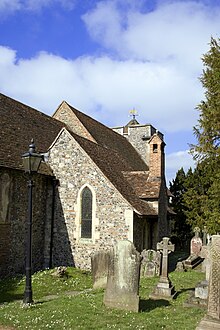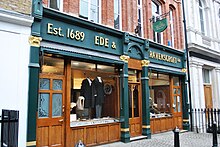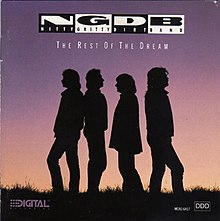Oscar Underwood
| |||||||||||||||||||||||||||||||||||||||||||||||||||||||||||||||||||||||||||||||
Read other articles:

Town in Tennessee, United StatesPittman Center, Tennessee Emert's Cove (former)[1]TownTown of Pittman CenterPittman Center City Hall SealMotto: A Community Dedicated to Preserving Our Mountain HeritageLocation of Pittman Center in Sevier County, Tennessee.Coordinates: 35°45′34″N 83°23′19″W / 35.75944°N 83.38861°W / 35.75944; -83.38861CountryUnited StatesStateTennesseeCountySevierSettled1784[1]Incorporated1974[1]Named forRev. Eli...

Aspect of history The Church of St Martin in Canterbury is the oldest extant church building in Britain still in use as a church. It is the oldest Anglican parish church. The history of Christianity in Britain covers the religious organisations, policies, theology and popular religiosity since ancient history. The Roman Catholic Church was the dominant form of Christianity in Britain from the 6th century through to the Reformation period in the Middle Ages. The (Anglican) Church of England be...

Esta página cita fontes, mas que não cobrem todo o conteúdo. Ajude a inserir referências. Conteúdo não verificável pode ser removido.—Encontre fontes: ABW • CAPES • Google (N • L • A) (Agosto de 2019) A tradução deste artigo está abaixo da qualidade média aceitável. Talvez tenha sido feita por um computador ou alguém que não conhece bem o português ou a língua original. Caso queira colaborar com a Wikipédia, co...
DB 10Siegburg - Friedrich-Wilhelms-Hütte Spoorwijdtenormaalspoor 1435 mmAangelegd doorRheinische Eisenbahn-Gesellschaft (Rhe)Geopend1 mei 1872Opheffingtreindienst1880Gesloten1918Heropend1922Gesloten1945Huidige statusopgebroken Traject Legenda DB 2651 van Gießen DB 2657 naar Olpe thans industrieaansluiting DB 2690 naar Frankfurt Stadion 0,0 Siegburg/Bonn Agger DB 2651 naar Köln Messe/Deutz DB 2690 naar aansl. Steinstraße 1,0 Driesch 2,0 Aggerdeich DB 2695 van Troisdorf in aanleg DB 2324 va...

Artikel ini sudah memiliki referensi, tetapi tidak disertai kutipan yang cukup. Anda dapat membantu mengembangkan artikel ini dengan menambahkan lebih banyak kutipan pada teks artikel. (November 2015) (Pelajari cara dan kapan saatnya untuk menghapus pesan templat ini) Jendela gerai Chancery Lane milik Ede & Ravenscroft yang menghadap ke Star Yard, dekat Royal Courts of Justice (tampak pakaian pengadilan dipamerkan di depan toko) Ede & Ravenscroft adalah penjahit tertua di London, kare...

الانتخابات التشريعية التركية 2002 →1999 3 November 2002 2007← All 550 seats in the Grand National Assembly حزب الأغلبية حزب الأقلية القائد رجب طيب أردوغان دنيز بايقال الحزب العدالة والتنمية الشعب الجمهوري آخر انتخاب – 8.71%, 0 seats المقاعد المربوحة 363 178 تغيّر المقعد New ▲ 178 تصويت شعب�...

2015 Januari Februari Maret April Mei Juni Juli Agustus September Oktober November Desember ◀ Juli 2014 sunting halaman ini riwayat halaman ini Juli 2016 ▶ Kunjungi halaman utama Portal Peristiwa Terkini Senin, 04 Desember 2023 Senin, 15.04 UTC Senin, 22.04 WIBSenin, 23.04 WITASelasa, 00.04 WIT ◀ Juli 2015 ▶ M S S R K J S 1 2 3 4 5 6 7 8 9 10 11 12 13 14 15 16 17 18 19 20 21 22 23 24 25 26 27 28 29 30 31 Kematian bulan ini 1: Nicholas Winton (106), pekerja kemanusiaan Britania 5: Yoic...

1990 studio album by Nitty Gritty Dirt BandThe Rest of the DreamStudio album by Nitty Gritty Dirt BandReleased1990Genre Country Country rock Folk rock Bluegrass LabelMCAProducerRandy ScruggsNitty Gritty Dirt BandNitty Gritty Dirt Band chronology Will the Circle Be Unbroken: Volume Two(1989) The Rest of the Dream(1990) Live Two Five(1991) Professional ratingsReview scoresSourceRatingAllmusic[1] The Rest of the Dream is the 1990 album from the Nitty Gritty Dirt Band. Track listi...

HMS Queen Elizabeth di Lemnos pada 24 April 1915 Tentang kelas Nama:Kelas Queen ElizabethOperator: Angkatan Laut Britania RayaDidahului oleh:Kapal tempur kelas-Iron DukeDigantikan oleh:Kapal tempur kelas-RevengeBertugas:1914–1947Rencana:6Selesai:5Batal:1Hilang:1 Ciri-ciri umum Kelas dan jenis Kapal tempurBerat benaman 27.500 ton (standard) 36.500 ton (muat penuh)Panjang 645 ft 9 in (196,82 m)Lebar 90 ft 6 in (27,58 m)Daya muat 30 ft 2 in (9,...

Brand of inline skates This article is about the company and trademark. For the generic skates, see inline skates. For the songs, see Rollerblades (Eliza Doolittle song) and Rollerblades (Kwes song). RollerbladeTypePrivateIndustrySporting Goods[1]FoundedMinnesota, incorporated 1982 as Ole's Innovative Sports[2]FounderBrennan OlsonScott Olson[1]HeadquartersWest Lebanon, New Hampshire[1]Area servedWorldwideKey peopleRollerblade USAJeremy Stonier (Co-President)Ste...

1978 video gameSubmarineJapanese promotional flyer.Developer(s)NamcoPublisher(s)JP: NamcoNA: Midway GamesDesigner(s)Akira Osugi[2]Platform(s)ArcadeReleaseJP: 1978NA: September 1979[1]Genre(s)Torpedo shooterMode(s)Single-player, multiplayer (alternating turns)[1] Submarine[a] is an electro-mechanical arcade game that was released by Namco in 1978, and was licensed to Midway for US manufacturing and distribution in September 1979. Gameplay The player uses the yel...

Sybra neopomeriana Klasifikasi ilmiah Kerajaan: Animalia Filum: Arthropoda Kelas: Insecta Ordo: Coleoptera Famili: Cerambycidae Subfamili: Lamiinae Tribus: Apomecynini Genus: Sybra Spesies: Sybra neopomeriana Sybra neopomeriana adalah spesies kumbang tanduk panjang yang berasal dari famili Cerambycidae. Spesies ini juga merupakan bagian dari genus Sybra, ordo Coleoptera, kelas Insecta, filum Arthropoda, dan kingdom Animalia. Larva kumbang ini biasanya mengebor ke dalam kayu dan dapat menyebab...

Comics intended primarily or strictly for adult readers This article includes a list of general references, but it lacks sufficient corresponding inline citations. Please help to improve this article by introducing more precise citations. (January 2012) (Learn how and when to remove this template message) Adult comicsHouse ad, Fiction House (defunct magazine & comics publisher), Wings #61, 1945, Fiction HousePublishersVertigo ComicsMarvel Comics' Max lineMetal MammothNBM PublishingFantagr...

Chilean footballer (born 1987) Felipe Seymour Personal informationFull name Felipe Ignacio Seymour DobudDate of birth (1987-07-23) 23 July 1987 (age 36)Place of birth Pirque, Santiago, ChileHeight 1.74 m (5 ft 9 in)Position(s) Defensive midfielderYouth career2005–2007 Universidad de ChileSenior career*Years Team Apps (Gls)2006–2011 Universidad de Chile 96 (2)2011–2014 Genoa 27 (0)2012 → Catania (loan) 13 (1)2013 → ChievoVerona (loan) 7 (0)2013–2014 → Spezia (...

Découpage cantonal du département de Lot-et-Garonne, avec en surimpression les arrondissements (en nuances de bleu) - Carte arrêtée au 1er janvier 2019. Le département français de Lot-et-Garonne était divisé en 40 cantons depuis 1984. À partir de 2015, ce nombre est réduit à 21 à la suite du redécoupage cantonal de 2014. Histoire Découpage cantonal entre 1984 et 2015 Le canton d'Agen-Est est divisé en deux cantons (Agen - Sud-Est et Agen - Nord-Est) par décret du 24 décembre ...

Odznaki jednostek inżynieryjnych Wojska Polskiego – opis odznak brygadowych, pułkowych i batalionowych jednostek inżynieryjnych Wojska Polskiego. Odznaki pułków/ batalionów saperów II RP Grafika Opis odznaki 1 batalion saperów Legionów Odznakę stanowi srebrny krzyż maltański, w którego centrum umieszczono medalion emaliowany w kolorach wojsk samochodowych. Na medalion nałożono inicjały patrona pułku TK na czerwonym tle, a wokoło na czarnym tle napis P l SAP LEGJONÓW. Na r...

Motor vehicle Tata Magic IrisOverviewManufacturerTata MotorsAlso calledTata Ace ZipProduction2010-presentAssemblyPune, India Uttarakhand, IndiaBody and chassisClassMicrovan/MinivanBody style3-door MPVLayoutRR layoutPowertrainEngine0.6 L diesel SingleTransmission4-speed TA59 manual transaxle[1]DimensionsWheelbase1,650 mm (65.0 in) [1]Length2,960 mm (116.5 in) [1]Width1,512 mm (59.5 in) [1]Height1,800 mm (70.9 in)...

Further information: Sundiata Keita, Epic of Sundiata, and Military history of the Mali Empire This article needs additional citations for verification. Please help improve this article by adding citations to reliable sources. Unsourced material may be challenged and removed.Find sources: Twelve Doors of Mali – news · newspapers · books · scholar · JSTOR (March 2008) (Learn how and when to remove this template message) Part of a series on the History o...

У этого термина существуют и другие значения, см. J (значения). Буквы со сходным начертанием: J · Ϳ · յ · ȷ · ᴊ · ل Буква кириллицы йе Јј Изображение ◄ Є Ѕ І Ї Ј Љ Њ Ћ Ќ ► ◄ є ѕ і ї ј љ њ ћ ќ ► Характеристики Название Ј: cyrillic capi...

Furry convention Anthro New EnglandStatusActiveGenreFurryVenueWestin Boston Seaport HotelLocation(s)Boston, MassachusettsCountryUnited StatesInaugurated2015Most recent2023Attendance3,548 in 2023Organized byAnthro New England, Inc.Websiteanthronewengland.com Anthro New England (ANE) is a furry convention that is held in the Greater Boston area of the U.S. state of Massachusetts. It was first held in 2015 in Cambridge, Massachusetts, but moved to the Boston Park Plaza in 2018 and has been held ...




